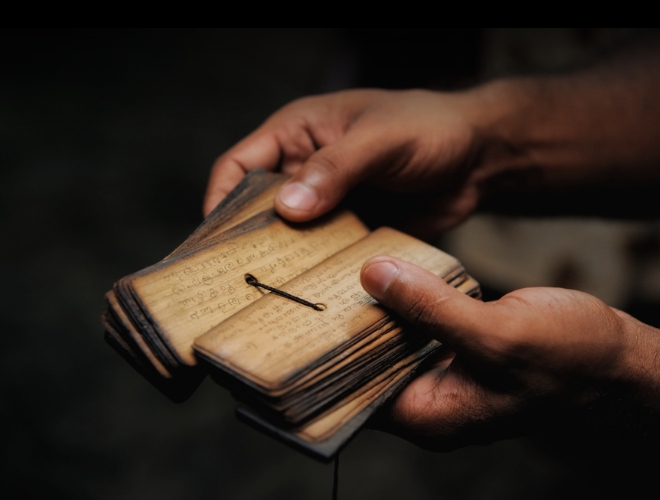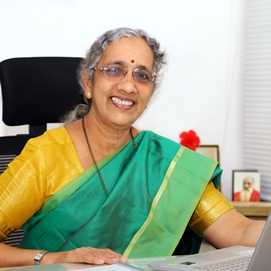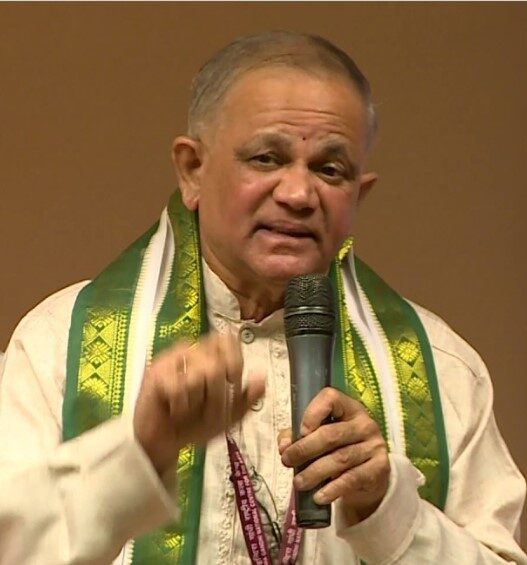INDICA’s Center for Bhasha Studies (CBS) invites you to an online symposium on Yāskācārya’s Nirukta on Sunday, July 2nd, 2023, from 4:00 to 7:30 PM IST.
The Nirukta is one of the six Vedāṅga-s, or auxiliary disciplines of the Vedas. It is considered the “ear of the Vedapuruṣa,” (Sarasvati, 2008, p. 345) or an essential text for understanding the Vedas. Attributed to Yāskācārya, a Ṛṣi who has been called “the first etymologist of the world,” (Mishra, 2022, p. 234) the Nirukta is a commentary on the Nighaṇṭu, a compilation of Vedic words.
The Nirukta is the earliest surviving work of its kind, and it aims to decipher the meaning of Vedic passages through etymological analysis of words, keeping in mind the context of the Vedic texts. In his introduction to Nirukta published over a 100 years ago, Lakshman Sarup—the first person to submit a DPhil thesis at Oxford—elaborated, in substantial detail, on Yāska’s contribution to etymology, philology, and semantics. Sarup observed that Yāska was “the first writer on etymology” (Sarup, 1920, p. 56) and “the first to treat it as a science by itself.” (ibid.) He also noted that some of Yāska’s arguments about words were “strikingly modern.” (Sarup, 1920, p. 65)
David Zilberman has rightly called the Nirukta a “polythematic” (Zilberman, 1988, p. 90) text, meaning that it covers a wide range of topics related to language and meaning. It is a profound and important work, and despite being “… the world’s first text of interpretation…” (Kapoor, 2013, p. 94), it appears to not be as well-known (Poll) as it should be. This symposium aims to contribute to addressing this lack of awareness.
Join us on Sunday, July 2nd, 2023, from 4:00 to 7:30 PM IST to delve into the profound insights of Yāskācārya’s Nirukta.
References:
Kapoor, K. (2013). Conceptualizing India—The Given and the Borrowed. In A. N. Balslev (Ed.), On India: Self-image and Counter-image. Sage Publications India Pvt Ltd. Delhi.
Mishra, S. (2022). The Rishi Tradition of Bhārat. Subbu Publications. Bengaluru.
Saraswati, C. (2008). Hindu Dharma : The Universal Way Of Life. Bharatiya Vidya Bhavan. Mumbai.
Sarup, L. (1920). THE NIGHAṆṬU AND THE NIRUKTA: The oldest Indian treatise on Etymology, Philology and Semantics [INTRODUCTION]. London. https://archive.org/details/nighantuniruktao01saru/mode/2up
Zilberman, D. B. (1988). The Birth of meaning in Hindu thought (R. S. Cohen, Ed.). Reidel.
***SCHEDULE***
| 1 |
Megh Kalyanasundaram
Director-Special Projects, INDICA |
Invocation And Symposium Overview |
4:00 PM |
| 2 |
Prof. Gauri Mahulikar
Academic Director of Chinmaya International Foundation, Ernakulam, Kerala |
Study Of Some Homonyms In Nirukta (In The Light Of Durgacharya’s Commentary) |
4:15 PM |
| 3 |
Dr. Vasantkumar M. Bhatt
Professor (Retd.), Sanskrit Scholar, Author, and Manuscriptologist; Retired in 2015 as Director of the School of Languages, Gujarat University,
Ahmedabad |
Insights About And From The Nighaṇṭu And The Nirukta |
5:00 PM |
| 4 |
Dr. Korada Subrahmanyam
Sanskrit Grammarian & Scholar, Professor (Retd.) |
Niruktam Is The Tail End Of Vyakaranam |
5:45 PM |
| 5 |
Megh Kalyanasundaram
Director-Special Projects, INDICA |
Beyond Etymology: Nirukta’s Significance For Global Histories Of Science, Technology And Indian History Of Writing & Knowledge Systems |
6:30 PM |
| 6 |
Dr. Nagaraj Paturi
Senior Director & Chief Curator, INDICA |
Multiple Levels Of Meaning, Nirukta’s Lessons For Contemporary Lexicography |
7:00 PM |
Speakers
Prof. Gauri Mahulikar
Academic Director of Chinmaya International Foundation, Ernakulam, Kerala
Dr. Gauri Mahulikar is Academic Director of Chinmaya International Foundation, Ernakulam, Kerala, India. She was previously Officiating Vice Chancellor, and Dean of faculty at Chinmaya Vishwavidyapeeth. She is also former Head of Sanskrit Department, Mumbai University and former Head of Gurudev Tagore Chair of Comparative Literature, Mumbai
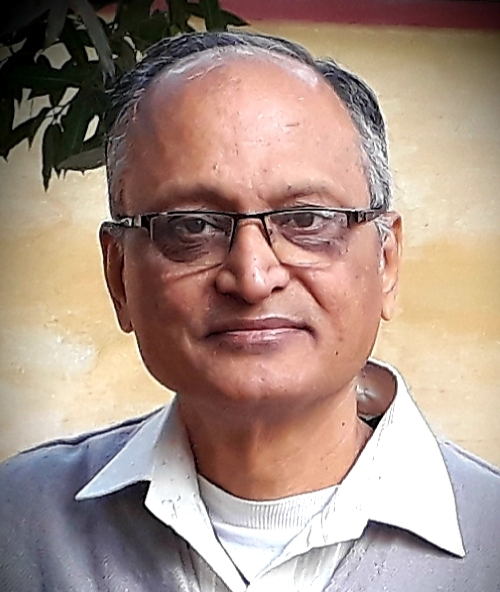
Dr. Vasantkumar M. Bhatt
Professor (Retd.), Sanskrit Scholar, Author, and Manuscriptologist; Retired in 2015 as Director of the School of Languages, Gujarat University, Ahmedabad
Recipient of a "Certificate of Honor" from the President of India in 2018 for his contributions to the field of Sanskrit, Dr Prof. Vasantkumar M. Bhatt self-identifies as a student of Sanskrit grammar. He retired as the Director of the School of Languages at Gujarat University where he was a Professor of Sanskrit and the Head of the Department of Sanskrit. He studied Pāṇini’s grammar under the guidance of Pt. Bal Krishna Pancholi Ji of Varanasi. Dr. Bhatt's areas of research have included the meta-rules of Pāṇini’s Aṣṭādhyāyī and his expertise in manuscriptology is highly regarded. He critically edited, for the first time, the Kashmiri recension of the Abhijñānaśākuntalam (from Birch Bark manuscripts in the Śāradā script). Amongst his many translations include those of the Ṛgveda, Nirukta, and multiple Sanskrit dramas. He is the author of 45 books and 150 research articles. He has been the research guide for 22 PhD candidates.
Dr. Korada Subrahmanyam
Sanskrit Grammarian & Scholar, Professor (Retd.)
Korada Subrahmanyam (born 1954) is a Sanskrit grammarian and scholar from India. He was a Professor of Sanskrit at the University of Hyderabad. Prof. Korada Subrahmanyam was born into a family of Vedic scholars hailing from the Godavari delta region, known as Konaseema. His areas of expertise include the Aṣṭādaśavidyā, Philosophy of Language, and Translation. He is also well versed in Mahābhāṣya, Vākyapadīya, Laghumañjūṣā, Ślokavārtikam and Tantravārtikam.
You can read more about him at https://koradeeyam.blogspot.com/p/about-me.html
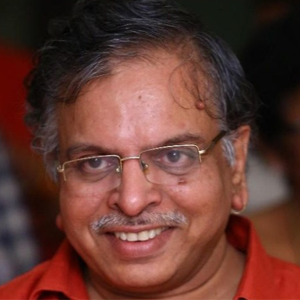
Dr. Nagaraj Paturi
Senior Director & Chief Curator, INDICA
Trained in Sanskrit and Advaita Vedanta by his hyper-polyglot, polymath and spiritually accomplished sakala-shaastra-paarangata father, late Sri Paturi Sitaramanjaneyulu garu, Dr Nagaraj Paturi is seriously committed to the transmission of Vedic sciences to the present generation. In his PhD thesis (1998, University of Hyderabad), he developed an Indic Model of Myth Criticism of Literature and in his MPhil (1987, University of Hyderabad), he foregrounded Vakyapadiya as the theoretical foundation of the Ashtadhyayi. In addition to over 50 publications and about 60 conference/seminar/workshop papers, Dr Paturi has designed several courses pertaining to the contemporary applications of Vedic Sciences and has been successfully teaching them and getting them taught. Formerly Senior Professor of Cultural Studies FLAME School of Communication (& FLAME School of Liberal Education) and a Visiting Professor, University of Chicago (USA), Dr Paturi is currently Senior Director and Chief Curator at INDICA, a Distinguished Professor, Curriculum Designer, Executive Committee Member, Board of Studies, MIT School of Vedic Sciences (Pune, Maharashtra), Member, Board of Studies at Kavikulaguru Kalidasa Sanskrit University (Ramtek, Maharashtra) and Rashtram School of Public Leadership (Sonipat, Haryana). He is also the Editor-in-Chief of International Journals of Studies in Public Leadership and is a member of the Advisory Council of Veda Vijnana Shodha Samsthanam (Bengaluru, Karnataka). He has provided consultancy to numerous culture research, theatre, and dance innovation projects. He has authored scores of creative writing works for Classical Dance, Modern Theater, and magazines and has delivered several series of talks and other programs on Radio and Television channels.
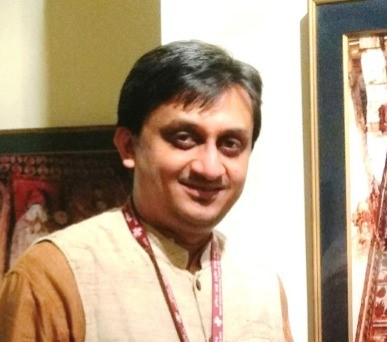
Megh Kalyanasundaram
Director-Special Projects, INDICA
An Indian citizen with close to nine years of lived experience in China, he is an alumnus of Indian School of Business, Hyderabad, and currently the Director of Special Projects at INDICA. His post-graduate specialization in Strategy, Leadership and Marketing included a study of research methods. His professional experience includes stints as a Market Leader at a Global Fortune 50 firm while he has served a term on the Board of a Shanghai-based not-for-profit. His academic writings span some aspects of ancient Indian chronology, Indian Knowledge Systems, Landscape in Indic texts, Ancient Indian Jurisprudence, Ideas of India and Philosophy. Other professional and pro-bono pursuits have included building differentiated digital platforms for Indic texts targeted at specific learning and research needs and music. His research-based compositional Sanskrit music album ‘Bhārata and her Kāśmīra’ has been listed by the Indira Gandhi National Centre for the Arts. His subsequent music album ‘Indian Knowledge Systems and Yāskācārya’s Nirukta’ has recently been accepted for listing by the Vedic Heritage Portal. In 2022, the National Museum Institute invited him to contribute content for multiple projects currently underway, including ones on Jammu Kashmir & Ladakh and Kedarnath. In 2023, he was nominated by the Chairman of ICHR as a Member of a National Committee for an initiative focused on Jammu, Kashmir, and Ladakh. His work has been featured in both editions (Chennai and Pune) of Vitasta (2023), a multi-city festival focused on Kashmir organized by the Ministry of Culture, Government of India.

